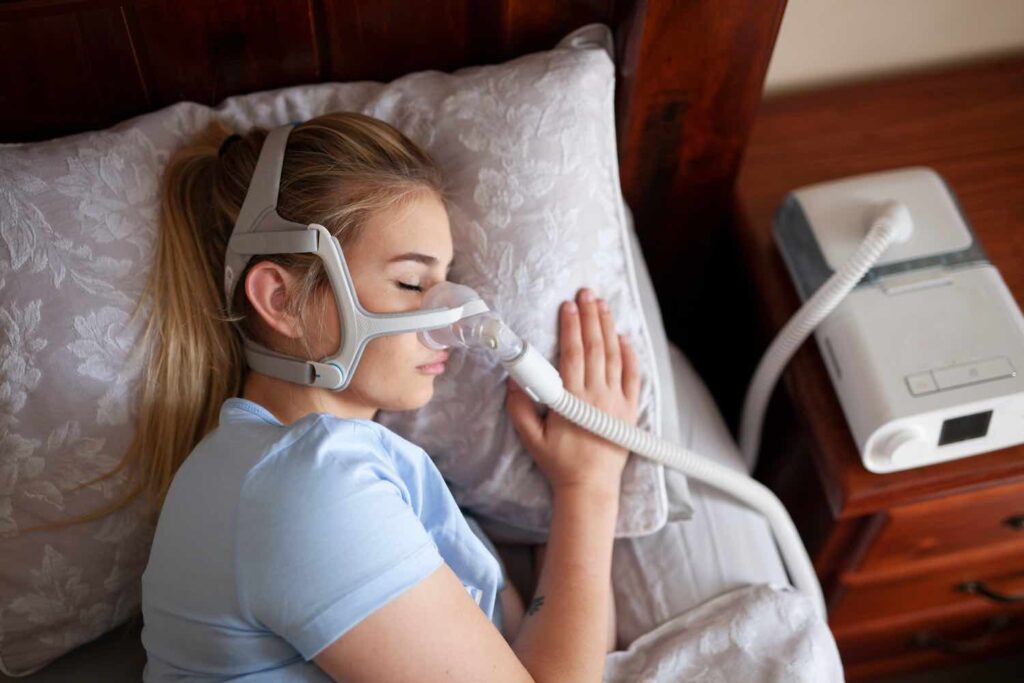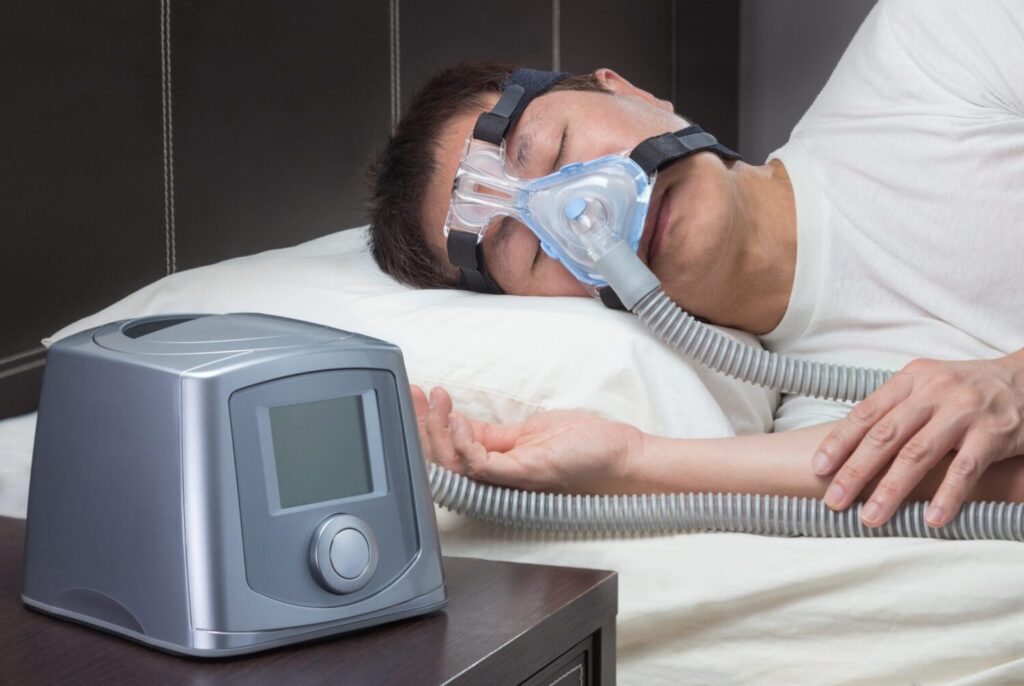In today’s fast-paced world, getting a good night’s sleep is crucial for our overall well-being. However, for over 25 million Americans suffering from sleep apnea, a restful night can seem like an impossible dream. Sleep apnea is a common sleep disorder characterized by repeated interruptions in breathing during sleep. These interruptions, known as apneas, can occur multiple times throughout the night, leading to fragmented sleep and a host of health problems.
An Introduction to Sleep Apnea Machines
Sleep apnea machine, also known as continuous positive airway pressure (CPAP) machines, are the gold standard treatment for sleep apnea. These devices work by delivering a constant flow of pressurized air through a mask, which helps keep the airway open and prevents apneas from occurring.
Sleep apnea is a common sleep disorder characterized by pauses in breathing or shallow breaths during sleep. These pauses can last for a few seconds to a few minutes and may occur multiple times throughout the night. Sleep apnea can lead to daytime sleepiness, fatigue, and other health issues if left untreated.
CPAP machines are designed to address the underlying cause of sleep apnea by providing a continuous stream of air pressure. This pressure acts as a splint to keep the airway open, allowing for uninterrupted breathing during sleep. By keeping the airway open, CPAP machines effectively prevent apneas and improve oxygen levels in the body.

How Sleep Apnea Machines Work
CPAP machines use a small air compressor to generate air pressure, which is then delivered through a hose and mask worn over the nose or mouth. The continuous positive airway pressure acts as a splint to keep the airway open, allowing for uninterrupted breathing during sleep. With proper usage, sleep apnea machines can significantly improve sleep quality and alleviate symptoms.
The mask used with CPAP machines is designed to fit securely over the nose, mouth, or both. It is important to find a mask that is comfortable and provides a good seal to ensure the effectiveness of the treatment. There are different types of masks available, including nasal masks, full-face masks, and nasal pillows, allowing individuals to choose the one that suits their preferences and needs.
CPAP machines also come with various features to enhance comfort and usability. Some machines have humidifiers that add moisture to the air, reducing dryness and irritation in the airways. Others have ramp features that gradually increase the air pressure over a set period of time, allowing users to adjust to the therapy more comfortably.
Different Types of Sleep Apnea Machines
There are various types of sleep apnea machines available, including traditional CPAP machines, automatic CPAP machines, and bi-level positive airway pressure (BiPAP) machines. While traditional CPAP machines deliver a constant pressure, automatic CPAP machines adjust the pressure based on the individual’s needs throughout the night.
Automatic CPAP machines, also known as APAP machines, use advanced algorithms to monitor the individual’s breathing patterns and adjust the pressure accordingly. This ensures that the optimal pressure is delivered at all times, maximizing the effectiveness of the treatment. APAP machines are particularly useful for individuals whose pressure needs vary throughout the night.
BiPAP machines, on the other hand, provide different pressures for inhaling and exhaling. This feature can be beneficial for those who find it difficult to exhale against high pressure, as it allows for easier breathing. BiPAP machines are often prescribed for individuals with certain medical conditions or specific breathing difficulties.
When choosing a sleep apnea machine, it is important to consult with a healthcare professional who can assess your specific needs and recommend the most suitable option. Factors such as the severity of sleep apnea, individual preferences, and any underlying medical conditions should be taken into consideration to ensure the best possible treatment outcome.
The Benefits of Using Sleep Apnea Machines
Using sleep apnea machines offers a multitude of benefits for individuals dealing with sleep apnea. These benefits extend beyond a more peaceful night’s sleep.
Improving Sleep Quality with Sleep Apnea Machines
By keeping the airway open and preventing apneas, sleep apnea machines ensure uninterrupted breathing, allowing individuals to achieve a deeper and more restful sleep. This results in increased energy levels, improved mood, and enhanced cognitive function during the day.
Long-Term Health Benefits of Sleep Apnea Machines
Consistent usage of sleep apnea machines can have significant impacts on long-term health. By maintaining adequate oxygen levels throughout the night, these devices help reduce the risk of cardiovascular problems, including high blood pressure, heart disease, and stroke. Additionally, they can help control blood sugar levels in individuals with diabetes and improve overall quality of life.
Overcoming Challenges with Sleep Apnea Machines
While sleep apnea machines are highly effective, some individuals may encounter challenges when first using them. However, with the right knowledge and support, these challenges can be easily overcome.
Common Concerns and How to Address Them
Some common concerns include mask discomfort, dry mouth, and difficulty adjusting to the sensation of continuous airflow. To address mask discomfort, it is important to find the right size and style of the mask and ensure it is properly fitted. Dry mouth can be alleviated by using a heated humidifier with the sleep apnea machine. As for adjusting to the continuous airflow, it typically becomes more comfortable with time as individuals become accustomed to the therapy.

Tips for Adjusting to a Sleep Apnea Machine
It is normal to experience an adjustment period when starting therapy with a sleep apnea machine. To ease this transition, it can be helpful to gradually increase usage time, practice relaxation techniques, and establish a consistent bedtime routine. Seeking support from healthcare professionals or joining support groups can also provide invaluable guidance and encouragement.
In conclusion, sleep apnea machines play a vital role in providing restful nights for individuals with sleep apnea. By keeping the airway open and allowing for uninterrupted breathing, these devices promote better sleep quality and reduce the associated health risks. If you suspect you may be suffering from sleep apnea, don’t delay seeking medical advice. With the right treatment and support, you can breathe easy and enjoy truly restful nights.
Understanding Sleep Apnea
Sleep apnea is a sleep disorder that affects millions of people worldwide. It is categorized into three main types: obstructive sleep apnea (OSA), central sleep apnea (CSA), and complex sleep apnea syndrome (CSAS). OSA, the most prevalent form, occurs when the muscles in the throat fail to keep the airway open. This obstruction can be caused by various factors, including excess weight, enlarged tonsils, or a narrow airway. CSA, on the other hand, is caused by a dysfunction in the brain’s signaling to the muscles responsible for breathing. This means that the brain fails to send the proper signals to the respiratory muscles, resulting in pauses in breathing during sleep. CSAS, as the name suggests, is a combination of OSA and CSA.
The Science Behind Sleep Apnea
During a sleep apnea episode, the airway becomes partially or fully blocked, leading to a decrease in oxygen levels. This drop in oxygen triggers the brain to briefly awaken from deep sleep to reopen the airway. These awakenings, known as microarousals, are often so brief that the individual may not consciously remember them. However, they disrupt the normal sleep cycle and prevent the person from achieving restorative deep sleep.
When the airway is blocked, the body’s natural response is to increase the effort to breathe. This can result in loud snoring, as the air tries to pass through the narrowed or obstructed airway. The repeated disruptions in breathing can cause the person to wake up gasping for air, leading to fragmented and poor-quality sleep.
Furthermore, the decrease in oxygen levels during sleep apnea episodes can have detrimental effects on the body. Oxygen is essential for the proper functioning of organs and tissues. When the body is deprived of oxygen, it can lead to various health issues, including high blood pressure, heart disease, stroke, and diabetes.
Common Symptoms and Risks of Sleep Apnea
Recognizing the symptoms of sleep apnea is crucial for early diagnosis and treatment. Common signs of sleep apnea include loud snoring, daytime sleepiness, morning headaches, restless sleep, and difficulty concentrating. These symptoms can significantly impact an individual’s quality of life, leading to fatigue, irritability, and decreased cognitive function.
Left untreated, sleep apnea can have serious health consequences. The repeated interruptions in breathing can put a strain on the cardiovascular system, leading to high blood pressure and an increased risk of heart disease. Sleep apnea has also been linked to an increased risk of stroke, as the lack of oxygen during episodes can damage blood vessels in the brain. Additionally, sleep apnea is associated with an increased risk of developing type 2 diabetes, as the disrupted sleep patterns can affect insulin sensitivity.
It is important to seek medical attention if you suspect you may have sleep apnea. A proper diagnosis can be made through a sleep study, which involves monitoring your sleep patterns and breathing during the night. Treatment options for sleep apnea include lifestyle changes, such as weight loss and avoiding alcohol and sedatives before bed, as well as the use of continuous positive airway pressure (CPAP) machines or oral appliances to keep the airway open during sleep.

The Importance of Restful Sleep
Quality sleep is crucial for our physical and mental health. It is during sleep that our bodies repair and rejuvenate themselves. Without enough restful sleep, we are more prone to fatigue, mood swings, decreased cognitive function, and an impaired immune system.
But what exactly happens when we sleep? During sleep, our bodies go through different stages, each with its own unique functions. In the first stage, known as non-REM sleep, our bodies relax and our brain waves slow down. This is followed by deeper stages of sleep, where our bodies repair tissues, build bone and muscle, and strengthen the immune system. It is also during these stages that memories are consolidated and learning takes place.
The Connection Between Sleep and Health
Research has shown that chronic sleep deprivation can have significant consequences for our health. Lack of sleep has been linked to obesity, depression, anxiety, and an increased risk of accidents. Therefore, it is essential to address sleep disorders such as sleep apnea to ensure we reap the numerous benefits of a good night’s sleep.
Obesity and sleep deprivation often go hand in hand. When we don’t get enough sleep, our bodies produce more ghrelin, a hormone that stimulates appetite, and less leptin, a hormone that suppresses appetite. This imbalance can lead to overeating and weight gain. Additionally, lack of sleep can affect our metabolism, making it harder for our bodies to burn calories efficiently.
Depression and anxiety are also closely linked to sleep problems. Sleep deprivation can worsen the symptoms of these mental health conditions, making it harder for individuals to cope with daily stressors. On the other hand, getting enough restful sleep can improve mood, increase resilience, and enhance overall well-being.
The Impact of Sleep Apnea on Quality of Sleep
Individuals with sleep apnea often experience poor-quality sleep due to frequent awakenings caused by breathing interruptions. This leads to daytime drowsiness, reduced productivity, and an overall decrease in the quality of life. Fortunately, sleep apnea machines offer a practical solution for managing this condition.
Sleep apnea is a sleep disorder characterized by pauses in breathing or shallow breaths during sleep. These interruptions can last for a few seconds to a few minutes and can occur multiple times throughout the night. As a result, individuals with sleep apnea may not reach the deep, restorative stages of sleep, leading to daytime fatigue and impaired cognitive function.
Continuous Positive Airway Pressure (CPAP) machines are commonly used to treat sleep apnea. These machines deliver a constant flow of air pressure through a mask, keeping the airway open and preventing breathing interruptions. By using a CPAP machine, individuals with sleep apnea can experience improved sleep quality, reduced daytime sleepiness, and better overall health.
In conclusion, restful sleep is essential for our well-being. It is a time for our bodies to repair, recharge, and prepare for the challenges of the day ahead. By understanding the connection between sleep and health, and addressing sleep disorders such as sleep apnea, we can ensure that we prioritize our sleep and reap the numerous benefits it offers.
More to read: How Laser Eye Surgery Can Correct Refractive Errors

